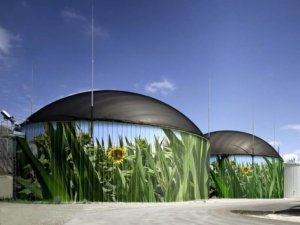
Air Moldova will resume flights on the route Chisinau-Kyiv from August 1 of this year, according to a press release from Boryspil International Airport. Kyiv-Chisinau flights will be carried out six times a week (except for Saturday) with departure from Kyiv at 17:10, and starting from September 22 daily. The route will be serviced by Airbus A319 aircraft with 134 seats and Embraer E190 with 111 seats. Business and economy class seats, board meals and free registration will be available for passengers.
In general, the airline serves 28 routes in Europe and the Middle East.
As reported, in July this year Moldova put Air Moldova on sale. Earlier, Air Moldova started flights from Chisinau to Kyiv and Odesa on October 26, 2015. Air Moldova is the national carrier of Moldova, based at Chisinau International Airport. It has a fleet of Embraer 190 and Airbus 320 aircraft.

A new biogas plant would start operating in the coming month in Okny district of Odesa region, Deputy Head of Odesa Regional Administration Svitlana Shatalova has written on her Facebook page. She said that at present the startup work is being conducted at the plant, which construction cost EUR 17 million.
“They want to build four more,” the official said. According to the Okny District Administration, the plant was designed to treat waste and silage into biogas for the production of electric and heat energy. The capacity of the complex will be 5 MW. It will create 25 jobs.
The sole founder of Wimexim Trade House with a statutory fund of almost UAH 29 million is Cyprus KO Biogas Development Company Ltd.

A requirement to create transport hubs in large cities outlined in the national construction standard “Planning and Territorial Development passed by the Regional Development, Construction, Housing and Utilities Economy Ministry of Ukraine is introduced from September 1, Deputy Minister Lev Partskhaladze has said. “We want all the route networks in Ukraine’s large cities with large passenger traffic to be connected to each other by transport and interchange hubs, so that cities will be able to form the right logistics and interconnections between all major modes of transport and regulate passenger traffic,” Partskhaladze wrote on his Facebook page.
According to him, this national construction standard establishes that the transport and transfer hubs should be located mainly in the urban periphery. International transport hubs should be located near airports, railway stations and ports, regional – near bus stations or suburban railway stations, and urban – at high-speed transport stations (subway, rapid tram, city railway), at the intersection of several types of passenger transport and in areas of large public or commercial facilities.
According to the new national construction standards, the time spent on transfers should not exceed 10 minutes, taking into account waiting time.
“The distance of pedestrian approaches to stops in transport and transfer hubs should not exceed 200 meters. If the design provides for exceeding this standard, then the time spent on transfers should be reduced, it is necessary to use local transport systems – escalators and moving walkways,” Partskhaladze said.

MS Social Project LLC (Kyiv), part of the ICU Group, will invest in construction of the largest unsegregated solid household waste treatment plant in Zhytomyr using a custom technology, ICU reported on Thursday. “The amount of our investments in the construction of the plant will be from EUR 7 million to EUR 10 million… After the implementation of this project in Zhytomyr we are considering the possibility of building this type of plants in other cities of Ukraine,” the company said in a press release, citing the managing partner of ICU Kostiantyn Stetsenko.
According to the document, Tehnix (Croatia), which is the equipment manufacturer and developer of MBT technology (mechanical, biological and thermal treatment of solid municipal waste) was selected a contractor for the implementation of the project. Tehnix has built and commissioned more than 50 similar plants in the EU countries, in the countries where solid household waste, as well as in Ukraine, is not segregated at home.
ICU said that the design capacity of the plant involves the processing of about 82,000 tonnes of solid waste per year. The preliminary construction period of the facility is one year from the moment of obtaining the required permits. It is planned that the plant will operate in two shifts, and the number of workers will be 150 people.
The depth of treatment using this technology will reach 85-95%, and its result will be the receipt of secondary raw materials, alternative refuse-derived fuel (RDF) for cement plants and compost from the organic fraction of solid waste, ICU said.
According to Stetsenko, this innovative technology has proved its effectiveness in many countries, as well as it does not provide for emissions into the environment. It has its own sewage treatment system. He added that the company is also considering this project not only as a business, but also as an important social project.